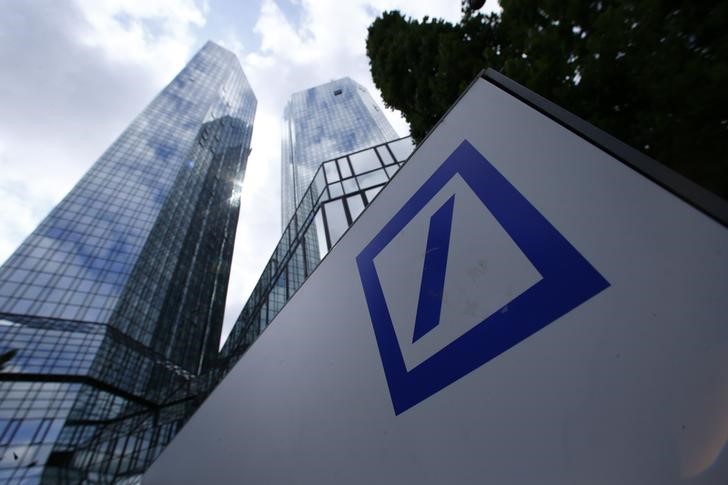FRANKFURT (Reuters) - Deutsche Bank (DE:DBKGn) has disputed allegations by Germany's financial watchdog, sources close to the lender said, in its official response to a preliminary report into interest rate manipulation which threatens sanctions against the bank and individuals.
The watchdog, Bafin, issued scathing criticisms of several executives at Deutsche Bank in a report, sent to the lender in May, on attempts to manipulate interbank interest rates such as Libor, according to a copy of the report published by the Wall Street Journal on Friday.
Managers at Germany's largest bank failed to ask tough questions or establish basic controls to prevent traders from attempting to manipulate interest rate benchmarks that determine prices for trillions of dollars in assets like home loans and credit cards, the report alleged. A copy of the report was posted online by the newspaper.
The report also alleges "major misconduct" by traders and "major failures" by members of the management board or the group executive committee, and refers to "substantial organizational defects", which continued in some cases until the beginning of 2014 – long after supervisors had sounded the alarm on market manipulation.
Deutsche Bank's full response was sent to Bafin in early July but has not been released publicly. Sources close to the bank said it rejected many of the allegations made in the regulator's report.
And in an emailed response to Reuters on Friday, Deutsche Bank said of the Bafin document:
"The report includes statements that are taken out of context. It would be unwarranted to infer conclusions about the conduct of the bank or any individuals at this stage."
Deutsche Bank has been hit by over 9 billion euros (6.3 billion pounds) in fines and settlements in the past three years, including a record $2.5 billion settlement with U.S. authorities for Libor.
The report's author, Frauke Menke, department president who is in charge of supervising Deutsche Bank, threatens the bank with further sanctions. "I will also conclusively examine imposing banking supervisory measures in this context which I consider to be necessary," Menke said in the report.
Bafin has the power to impose only moderate fines but can order the dismissal of executives.
The bank removed its co-Chief Executives Anshu Jain and Juergen Fitschen and installed a new CEO, John Cryan, on July 1, only weeks after the report was issued on May 11.
The tone of the regulator's comments and the threat of further sanctions underscore Cryan's challenge as he seeks to lead a sweeping strategic overhaul to slash costs, shrink the investment bank and jettison the group's separately branded retail wing Postbank (DE:DPBGn).
DISTRUST
It also illustrates deep tensions and mistrust between Deutsche and its national supervisor, Bafin, who handed over primary responsibility for policing big banks to the European Central Bank in November.
In one particular case, Bafin said Deutsche Bank's legal head, Richard Walker, "failed to pay sufficient attention" to the Libor process.
A spokesman for the bank, however, rejected the allegations as unfounded, saying that Walker had refuted Bafin's position in a letter to the regulator. The spokesman declined to say when the letter was sent or allow Reuters to see a copy of it.
Another top executive, Michele Faissola, now the head of the group's asset and wealth management division, is criticized in the report for not initiating an investigation earlier – as soon as 2007.
Faissola, however, disputes any implication that he should have known about or could have corrected any improper practices.
"He was never in charge of the area that submitted intra-bank offered rates," a Deutsche Bank spokesman said in an emailed statement.
Bafin also criticised Stefan Krause, former chief financial officer and still a board member responsible for the Postbank sale. His misconduct in the past relates to "insufficient investigation/clarification of facts and a failure to remedy defects regarding IBOR", according to Bafin.
It also said that Stephan Leithner, a former investment banker who joined the Deutsche board in 2012, must face allegations in connection "with the analysis of, and the consequences drawn from, the events". The bank, Krause and Leithner did not wish to comment on those allegations.
Bafin spokespersons could not immediately be reached to comment on Deutsche Bank's response to its report.
Bafin also sent a copy of the report to the European Central Bank (ECB) and Germany's Bundesbank. The ECB was not immediately available for comment, and Bundesbank declined to comment.

Bafin's new president, Felix Hufeld, recently chastised Deutsche Bank for having some "catching up" to do to ensure its systems and processes were up to the requirements of international financial rules.